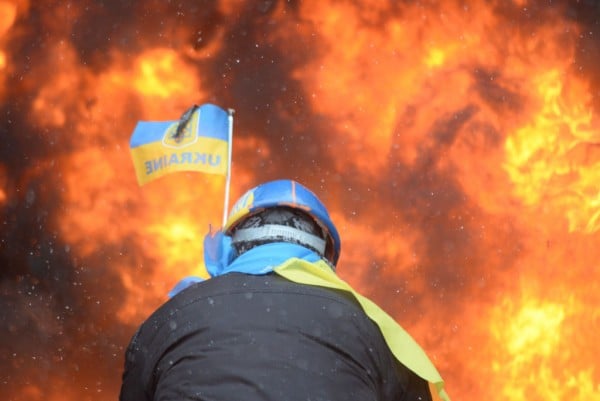
By Sarwar Kashmeri
The recent report by eight former U.S. senior diplomatic and military officials urging the United States and NATO to bolster Ukraine’s defense by providing military assistance to Ukraine — including lethal defensive assistance — is misguided and dangerous. The report’s recommendations are not in the best interest of either the United States or the transatlantic relationship. At best, this course of action would further damage any chances of a negotiated settlement between the West and Russia; at worst, it will provoke a full-throated Russian military response against Ukraine to forestall the delivery of arms from the United States. Then there will be calls to restore America’s credibility by force, and the United States will get drawn into yet another unwinnable conflict, this time against a nuclear armed state.
The United States has no vital national interests in this conflict. American security is not threatened by Russia’s actions in Ukraine. Nor are Russia’s actions in Ukraine in violation of United States treaty obligations. Russia has stayed clear of invading any country that is party to the North Atlantic Treaty Organization (NATO) which action would trigger the Alliance’s collective self-defense clause and require a response by all 28 members of NATO including the United States.
The strongest reason given by the authors of this report to expand the Ukraine-Russia conflict is that “Russia’s actions in and against Ukraine pose the gravest threat to European security in more than 30 years.” If this is true, and I do not believe it is, why are not the Europeans individually, or collectively through the European Union putting together an arms package for Ukraine?
“Everyone is waiting for American leadership. Nothing serious happens without the United States leading,” reply the group that wants the United States to take the lead in going eyeball to eyeball with Russia. This is a self-serving terminological inexactitude, as Winston Churchill might have phrased it. France and Britain did not wait around for the United States before they went to war with Libya. France sent its Foreign Legion forces into Mali when it felt its national interests were at stake. And let us not forget Margaret Thatcher’s dispatch of the Royal Navy to reclaim the Falkland Islands by force from Argentina. As General Brent Scowcroft, famed for his understanding of transatlantic issues and geopolitics, once told me, “Where the Europeans find their interests involved, they are probably more warlike than most other societies.”
The EU countries spend around $300 billion on their armed forces, which include two nuclear powers — France and Britain. Collectively, the EU countries are richer than the United States. Most importantly, Ukraine is in their backyard. If the EU countries do not believe that the Ukraine-Russia conflict is a mortal threat to European security why should the United States make this dangerous assumption?
The reality is the Europeans know that Ukraine and Georgia are buffer states for Russia. The two countries separate Russia from the borders of the European Union and NATO. Russia will fight to keep it that way. As it did in 2008 when Georgia sounded uppity and made overtures to begin membership proceedings in NATO. Russia invaded and almost destroyed the country, just as it will Ukraine to prevent it from joining the West. Which is why calling Russia’s-bluff, or sending lethal arms to Ukraine would be an expensive and dangerous mistake that would also weaken the transatlantic alliance, America’s most important relationship.
The argument that every country should be able to determine what is in its national interests is an ideal not often fulfilled in the real world of power-politics. When a major power’s vital national interests are at stake, it forgets about academic niceties and does what it must — just as America did when a small island off Florida thought it could run its own show and invited the Soviet Union to install a few nuclear tipped missiles on Cuba’s sovereign territory. We all know how that story ended.
The United States should not assume the mantle of leadership in the Russia-Ukraine conflict. The European Union should lead the charge to determine how to deal with this explosive situation. America should be on the team, but leave the leadership to the Europeans.
This article was originally published at The Huffington Post. You can find the original here.
Sarwar Kashmeri is a Fellow of the Foreign Policy Association, and an adjunct professor at Norwich University. You can follow him on Twitter @sarwar_kashmeri.